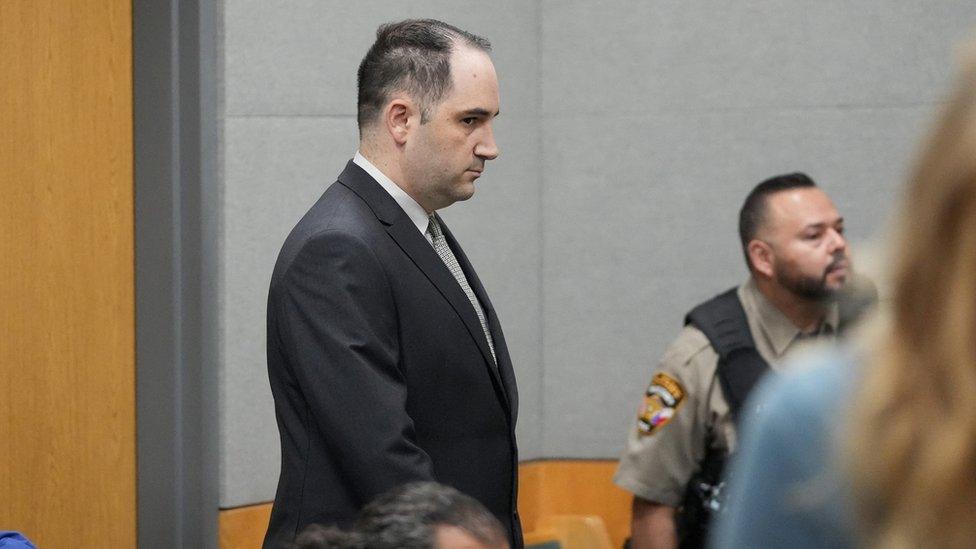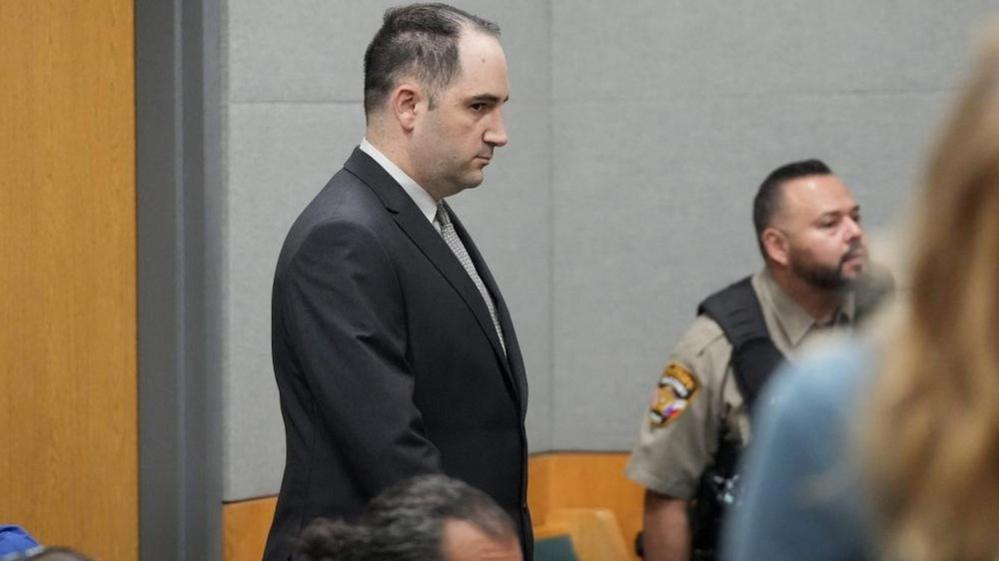US Army sergeant sentenced to 25 years for shooting protester
- Published

Texas Republicans want to pardon Daniel Perry under a self-defence clause
A US Army sergeant convicted of killing a Black Lives Matter protester in 2020 has been sentenced to 25 years in a case that has outraged conservatives.
A judge sentenced Daniel Perry, 36, on Wednesday, for fatally shooting Garrett Foster, 28, at a protest in Austin. Perry and Foster are both white.
Texas Governor Greg Abbott previously said he would pardon Perry as soon as an official request "hits my desk".
Republicans and Perry's attorneys have argued he acted in self-defence.
"After three long years we're finally getting justice for Garrett," Foster's mother, Sheila Foster, told the court on Wednesday, according to the Associated Press.
"Mr Perry, I pray to God that one day, he will get rid of all this hate that is in your heart."
The sentencing comes a month after a Travis County jury unanimously voted to convict Perry of Foster's murder.
The jury also found Perry not guilty on an additional charge of aggravated assault with a deadly weapon.
The former Army sergeant, now dressed in prison garb, began to cry as the judge issued his sentence.
Clinton Broden, a lawyer for Perry, called the case "political prosecution" in a statement, and vowed to appeal.
He added that Perry and his legal team would "fully co-operate in the pardon process".
Garrett Foster was killed on 25 July 2020, when Perry, a soldier who drove for Uber at the time, turned on to a street where Black Lives Matter demonstrators were marching, went through a red light and stopped his vehicle.
Foster, a former Air Force mechanic who was openly carrying an AK-47 style weapon - which is legal in Texas - was one of several protesters who approached Perry's vehicle.
Perry - who had no passenger at the time - said some of the demonstrators began banging on his car. The protesters told police they feared the vehicle might ram into them, according to media accounts.
Perry's lawyers argued that Foster began to raise the assault rifle toward Sgt Perry.
According to authorities, Perry lowered his window and shot Foster five times with a .357 revolver before driving off. He called 911 shortly afterwards.
Prosecutors had argued that Perry could have driven away if he feared for his safety, rather than firing his gun.
A forensic psychologist who examined Perry testified during his sentencing that he believed Perry suffered from post-traumatic stress disorder exacerbated by his time in the military and that he had developed an "us vs them" mentality.
Perry began searching for the locations of Black Lives Matter protests weeks before the shooting, according to court documents, external. He also messaged friends on social media, comparing protesters to "a bunch of monkeys flinging (expletive) at a zoo", court records show.
His lawyers argued Perry was legally acting in self-defence when he shot Foster.
Perry's case has become a lighting rod for so-called 'Stand Your Ground' laws, whichare enacted at the state level and generally permit an individual to protect themselves with the use of reasonable force, including deadly force, to prevent death or great bodily harm.
After his conviction in April, Governor Greg Abbott, a Republican, tweeted: "Texas has one of the strongest 'Stand Your Ground' laws of self-defence that cannot be nullified by a jury or a progressive District Attorney."
"I am working as swiftly as Texas law allows regarding the pardon of Sgt Perry," he said.
The state's pardon board, which must approve such pardon requests, said an expedited investigation would begin immediately.
Conservatives have attacked the prosecutor who brought the case, Travis County District Attorney Jose Garza, a Democrat.
Texas Attorney General Ken Paxton told Fox News in April that Mr Garza "maliciously prosecutes people that he doesn't like for political purposes".
Mr Garza has described the pardon request as a "naked political intrusion into our criminal justice system".
Related topics
- Published11 April 2023
